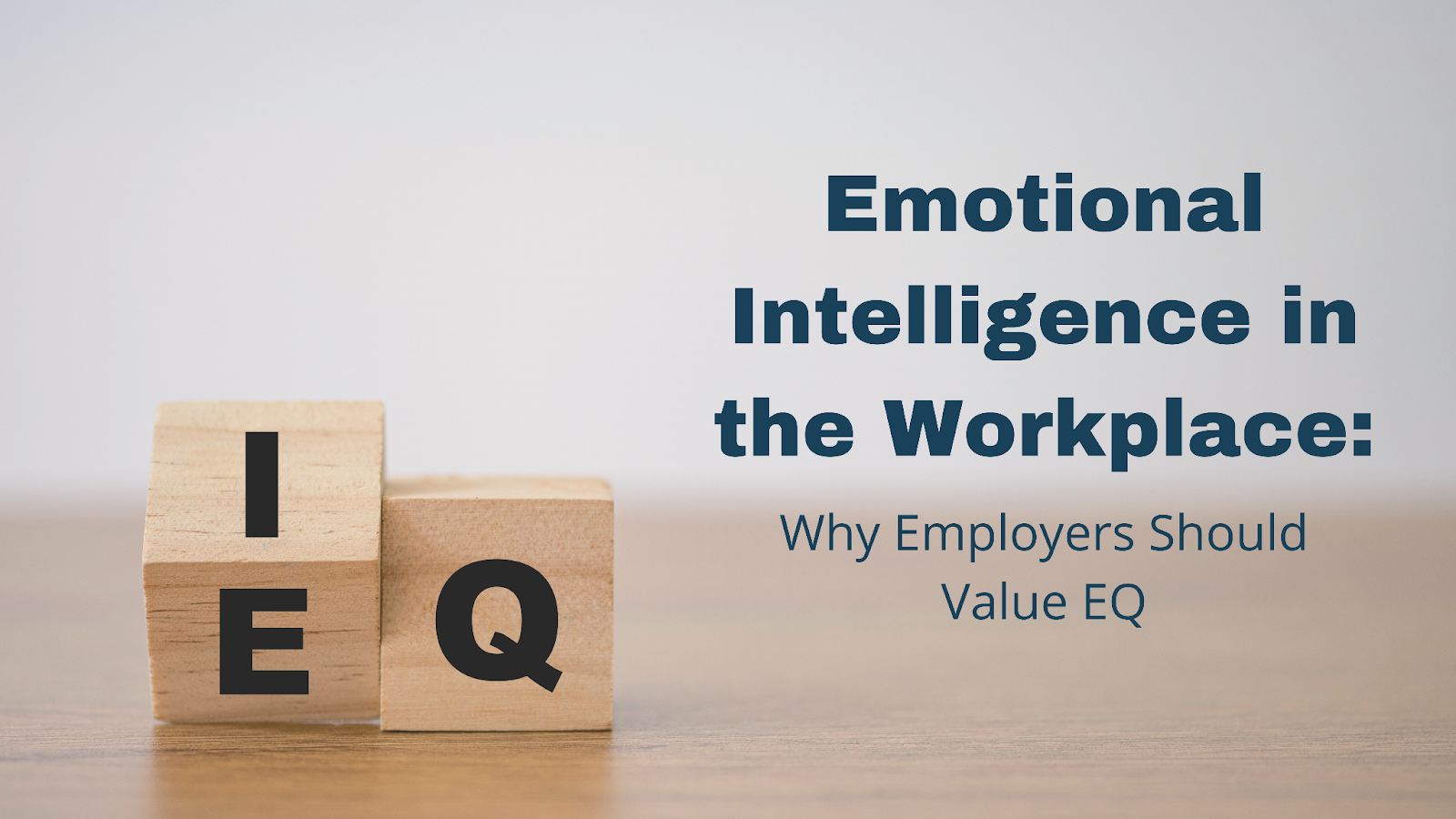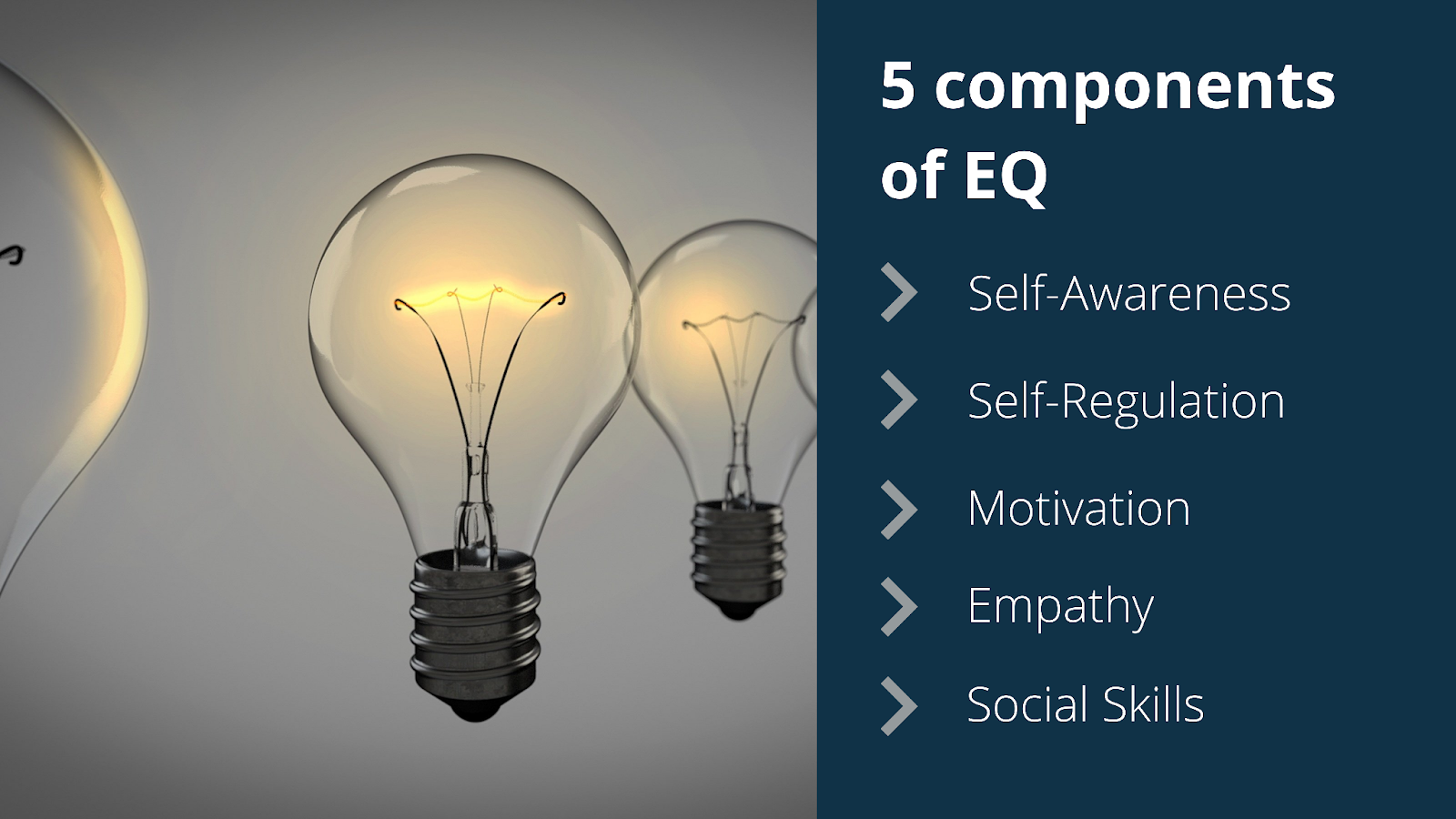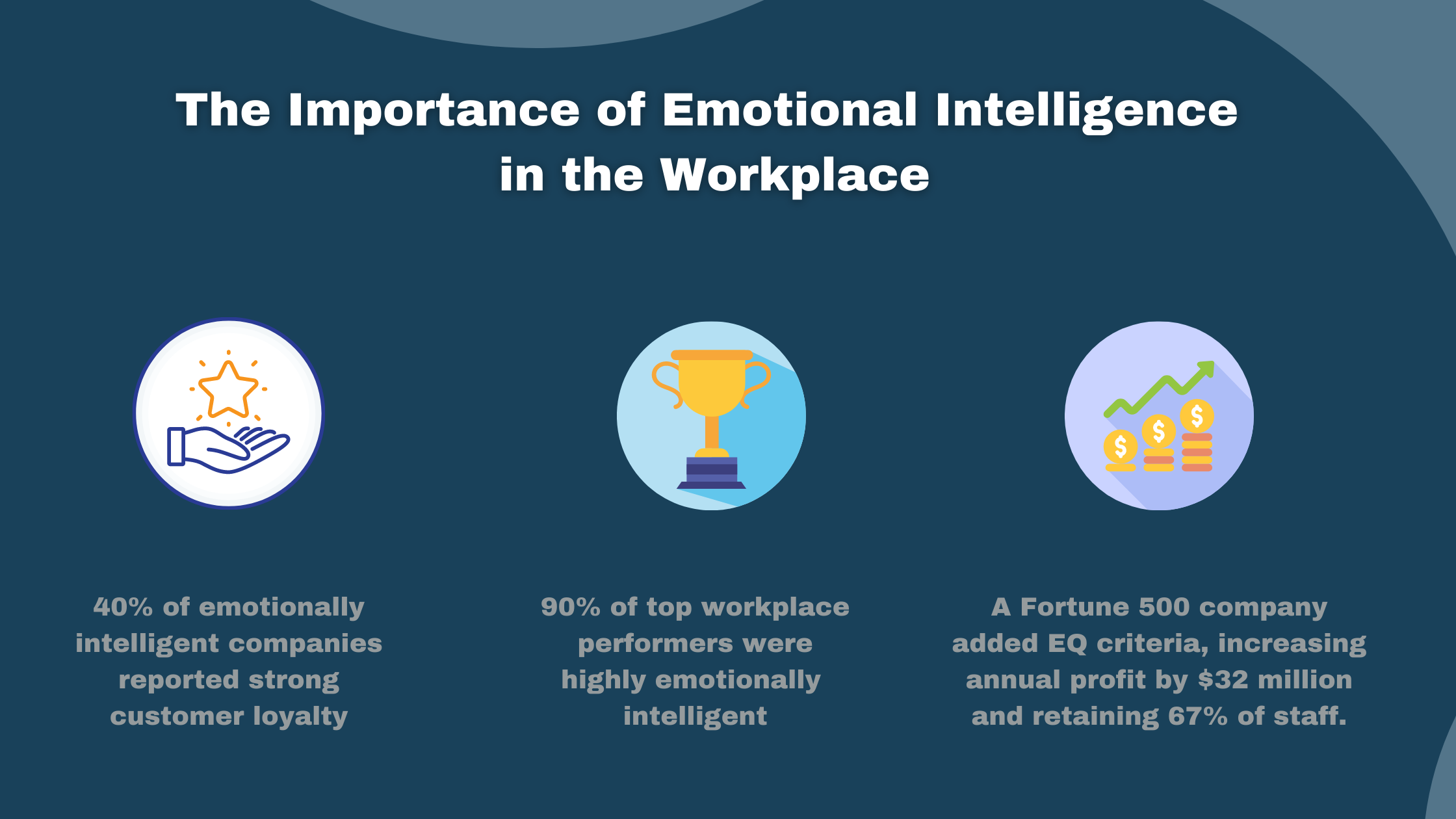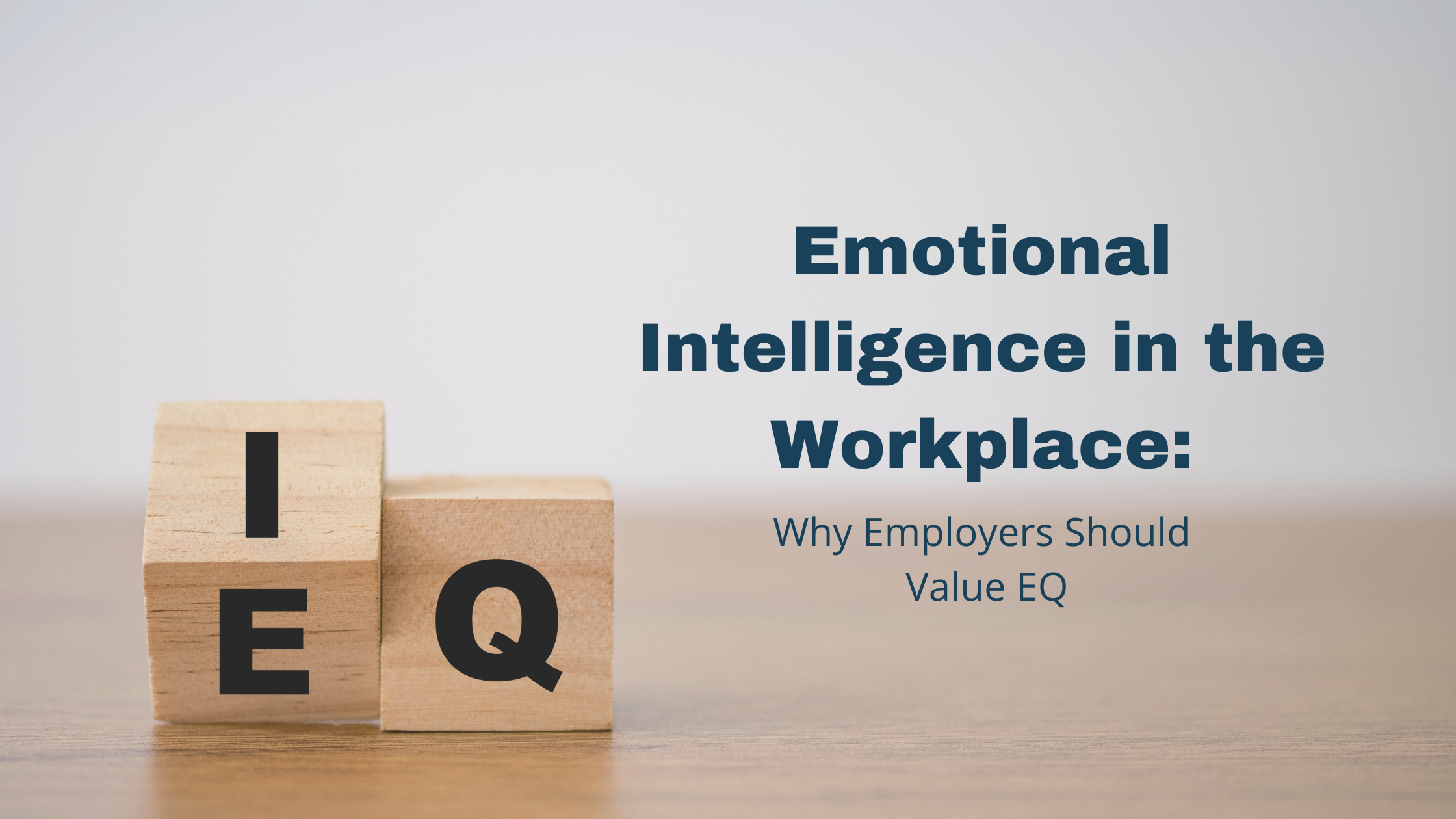Emotional intelligence in the workplace is often taken for granted in the hiring process. Unlike hard skills, few employers think to consider emotional intelligence or EQ when moving through their hiring process. Failure to recognize the presence or lack of emotional intelligence in employees can lead to a toxic work environment if left unchecked. Continue reading to learn why Employers should value EQ.

What is Emotional Intelligence in the Workplace?
Often called “emotional quotient” (EQ), emotional intelligence is the ability to recognize, understand, reason with and manage emotions both in yourself and in others. While psychologists once thought of emotions and intelligence as separate entities that could often interfere with one another, experts now recognize that the ability to perceive and manage emotions is a key part of overall intelligence.
Why is emotional intelligence in the workplace so essential? Because having high emotional intelligence makes you better at understanding others and the emotions they feel. That includes colleagues, supervisors, clients and customers. A person with low emotional intelligence will struggle to empathize with customers and understand their needs, step on colleagues’ toes and fail to recognize the effects of their actions or their supervisors’ opinions of them and ability to do their job.
Employees with high emotional intelligence were 20 times more productive than those with low emotional intelligence in a study of a Dallas company.

What are the 5 Components of Emotional Intelligence?
Emotional intelligence is a broad topic that can be difficult to assess and promote in your business. But if you break it down into its constituent parts, it becomes much easier to address. Below, you will find the 5 components of emotional intelligence and why they matter:
1. Self-Awareness
Employees who are self-aware understand how others perceive their actions, inactions and words. Self-aware employees often make great sales and customer service professionals. Being in tune with emotional cues displayed by those they interact with can be the key to success in their field.
An employee who lacks self-awareness is likely to struggle with customer-facing roles, often making bad impressions or even saying borderline offensive things. Low levels of self-awareness can also cause problems with other employees, who expect their colleagues to maintain professionalism and politeness at all times.
Fortunately, this is one of the components of emotional intelligence that is relatively easy to improve upon. An employee interested in becoming more self-aware might take an active role in assessing their daily interactions. They could do this by keeping a journal or scheduling regular chats with an accountability partner who helps them self-reflect on how they appear to others.
2. Self-Regulation
Self-regulation is a key component of emotional intelligence in the workplace. It allows you to make actionable changes to your behavior to put others at ease, communicate more effectively, and stay self-aware.
You might even think of self-regulation as restraint. An employee who possesses this skill is able to navigate frustrating interactions with colleagues or customers with ease. But an employee who cannot self-regulate might fly off the handle and say or do something harmful.
Employees who would like to improve their ability to self-regulate must change their thought patterns to emphasize problem-solving and positivity in the face of adversity. This is similar to the practice of mindfulness, and it is something that therapists can be particularly helpful with.
A large research review linked emotional intelligence in the workplace to strong decision-making, teamwork, stress management and coping skills.
3. Motivation
Motivation that comes from within is a cornerstone of emotional intelligence. An employee with low emotional intelligence may struggle to stay on task without constant external reminders, while an employee who is truly motivated and of high emotional intelligence may not struggle at all.
That is not to say that motivation is a constant. Like many other inner feelings, motivation ebbs and flows. For those who are in the midst of a motivation ebb, starting the flow again may involve re-examining your work and why you were first attracted to it, assessing your progress to date and reframing your short- and long-term goals.
4. Empathy
Empathy is perhaps the most important of the 5 components of emotional intelligence, particularly for leaders. Leaders who can empathize with their team members can understand the obstacles their team members face and work to mitigate them. They can also understand how to truly motivate employees.
An employee who lacks empathy may not understand how their actions affect their colleagues. This can lead to conflict and communication breakdowns, especially in collaborative work environments.
Improving empathy is actually quite simple. All you have to do is ask yourself how you would feel if you were the person you are interacting with, managing, working with or serving.
5. Social Skills
Social skills include communication, conflict resolution and giving praise. All three of these skills rely heavily on emotional intelligence for success. For example, an employee who exhibits high emotional intelligence in the workplace will find it easy to communicate with customers because they are empathetic enough to know how they want to be spoken to. An employee with low emotional intelligence, on the other hand, may not excel in conflict resolution because they lack the self-awareness necessary to understand why the conflict erupted in the first place.
Because social skills are a broad category, it can be difficult to improve them all with one action or strategy. However, practicing mindfulness and self-awareness in the workplace can help employees objectively assess their social skills, then identify which ones may need some work.
Why is Emotional Intelligence Important in the Workplace?
In the first year after a Fortune 500 company added EQ criteria to its sales team recruitment process, the company increased annual profit by $32 million and retained 67% of staff.

For decades, employers placed a premium on high IQs, but as our knowledge of workplace dynamics has evolved, the emphasis has shifted to high EQ. Technical skills have begun to occupy a much more critical role in the modern workplace, but without complementary emotional intelligence and related skills, employees often fall flat. And employers interested in promoting excellence in the workplace have started to understand this.
There is a market-driven reason for this change, too. Organizations that value emotional intelligence and ingrain it in their corporate culture often have an easier time with customer experience and satisfaction. That’s the finding of a Harvard Business Review research report, which found that 40% of emotionally intelligent companies reported strong customer loyalty. For companies that did not prioritize EQ, that figure was 12%.
In terms of performance, there is reason to believe that employees who have high emotional intelligence in the workplace will also perform well at their jobs. One survey found that 90% of top workplace performers were highly emotionally intelligent, while only 20% of low performers were.
EQ vs. IQ: Which is Most Important?
Trying to understand whether EQ or IQ is more important in the workplace isn’t just a matter of opinion. There’s hard science to back up the idea that EQ is just as important as — if not more important than, IQ. For example, a 2019 study of 279 early-career professionals found that emotional intelligence was a stronger predictor of career success than almost any other variable, including measures of IQ.
Reading the statistics and facts above, you might assume that EQ is the only measure of an employee’s potential for success, but we know that isn’t true. Raw intelligence (IQ) and hard skills still matter, and it’s critical that employers find a good balance between EQ and IQ as they make hiring and advancement decisions.
EQ and IQ are complementary skill sets, and when they come together for a single employee, you probably have a future company leader on your hands. The right balance allows an employee to relate well with both colleagues and customers while making the right decisions on technical matters specific to the job and industry they are in.

How to Improve Emotional Intelligence in the Workplace
Emotional intelligence in the workplace evolves over time, and business leaders can take an active role in developing emotional intelligence among employees. If you are interested in improving emotional intelligence at your company, follow these steps.
1. Look for signs of both high and low emotional intelligence. Through both your observation and your employees’ own self-reflections, identify emotional and behavioral patterns that can signal high or low emotional intelligence. For example, an employee who cannot function well on team projects may not have high emotional intelligence in the workplace.
2. Make an action plan to improve lacking EQ components with each employee. Praise employees for the ways in which they exhibit emotional intelligence, but make an individualized action plan to address the ways in which they don’t. This might involve having employees who struggle with self-awareness ask for feedback from their peers. Also, you might assign pieces of literature to employees who struggle with empathy, as reading has been shown to improve empathy.
3. Provide educational tools and books on emotional intelligence to support positive change. With action plans in place, empower your employees to bolster emotional intelligence in the workplace by giving the tools and resources they need. A key tool to provide will be books on emotional intelligence. Topical reading can keep employees focused and give them new strategies to try. Here are some books on emotional intelligence to try:
- Daniel Goleman’s “Emotional Intelligence: Why It Can Matter More Than IQ”
- Travis Bradberry and Jean Greaves’ “Emotional Intelligence 2.0”
- The short, sweet audiobook “Harvard Business Review Guide to Emotional Intelligence”
4. Check in regularly. Fostering emotional intelligence within your organization is not a set-it-and-forget-it endeavor. You have to check in on every employee’s progress. Praise them for progress and help them get back on track if they are slowing down.
Benefits of Emotional Intelligence in the Workplace
There is no question: High emotional intelligence in the workplace is tied to high business performance. In fact, Harvard Business Review found that 78% of employees who worked for companies that prioritized perceptiveness saw the link between emotional intelligence in the workplace and business performance.
It can be difficult to measure the real business impacts of emotional intelligence, but we know that strong EQ in the workplace often promotes a strong culture, and a strong culture breeds better customer service, product offerings and overall business performance.
To learn more on workplace leadership and excellence, check out the Al Hartman blog: https://alhartman.com/culture-of-excellence-in-the-workplace/





